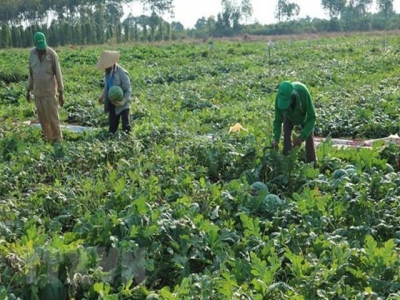Seeds for seedless watermelons exported to Japan

Ho Chi Minh City (VNA) - Loc Troi Group, a leading provider of agricultural services and products in Vietnam, on July 23 announced it had exported 8.1 kg of seeds that will grow into seedless watermelons to Japan.
Harvesting watermelons on a field as part of the Loc Troi - Hagihara Farm project (Photo: VNA)
According to Chairman of the group Huynh Van Thon, the seeds are part of a project between Loc Troi and Japanese-based Hagihara Farm Co., Ltd., which aims to teach Japanese watermelon cultivation techniques to Vietnamese farmers to build an organic model in the country. The project also targets the production and distribution of the seeds in Vietnam as well as their export to Japan and elsewhere.
Mai Tan Hoang, deputy head of Loc Troi’s research and development department, said one of the toughest requirements is to ensure the formation of a 99.9-percent purebred variety unharmed by microorganisms. This means strict standards for soil quality and temperature as well as the separation the seedless plantations from normal ones to avoid unwanted pollination.
Tran Viet Truong, a farmer in Hau Giang’s Chau Thanh district who was involved in the production of the first seed batch sent to Japan, said compared to growing normal commercial watermelons, the process for the Japanese variety requires much more advanced techniques.
The project has been carried out in the Mekong Delta province of Hau Giang and Tien Giang, with initial success of the first 8.1 kg of 99.97-percent purebred seeds for export.
Có thể bạn quan tâm
 Price of watermelons increases to VND4,000 per kilogram in Quang Ngai Province
Price of watermelons increases to VND4,000 per kilogram in Quang Ngai Province Although the price of watermelons is not high, it is still an advance amid the peak harvest of watermelons.
 Senegal a potential market for Vietnamese rice
Senegal a potential market for Vietnamese rice Việt Nam this year would have opportunities to continue increasing rice exports to Senegal, as well as Africa as a whole, due to high demand from those markets,
 EVFTA offers market gap for national agricultural sector
EVFTA offers market gap for national agricultural sector Joining the Vietnam-EU Free Trade Agreement is set to create favourable conditions for many of Vietnam’s advantageous items, such as agricultural products
 Vietnam’s fruit & vegetable sector eyes bright export prospects
Vietnam’s fruit & vegetable sector eyes bright export prospects Although it failed to meet its 2019 targets, the fruit and vegetable sector is aiming to achieve an export target of US$5 billion in 2020 due to several
 Farmers in central provinces enjoy good harvest of vegetables
Farmers in central provinces enjoy good harvest of vegetables Despite the Covid-19 outbreak, thanks to favorable weather, many kinds of vegetables and fruits in the winter-spring crop of farmers in the central